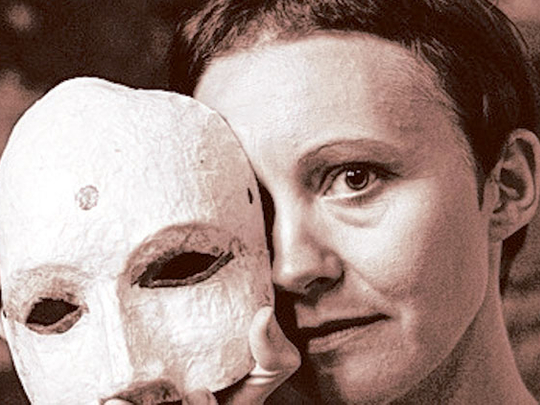
Fujairah: If you see your young child play acting in front of a mirror or in a pretend universe, relax. You might just be watching the next solo acting superstar.
Ask renowned Lithuanian poet and theatre actress Birute Mar, the recipient of the first Valery Khazanov Monodrama Award at the sixth Fujairah International Monodrama Festival on Monday.
The award, inspired by the Russian critic, producer, and mediator of theatre to the world, was given to Mar in recognition of her contribution to monodrama or one-actor theatre performances.
“When I was a child, I remember looking at myself in the mirror and dancing freely, as many children do. With that I felt free, light as a bird, and felt a sense that I will someday fulfil my dream,” Birute told Gulf News.
Birute was barely 10 years old when she debuted in the theatre for a part in the Old Man in the Iron Mountain in Lithuania in 1978. This was a year after she didn’t make the cut for an earlier screening for a theatre role.
The initial rejection propelled her to practise at home, with her family as her first audience.
Birute was formally schooled in music, theatre, and dance in St Petersburg, and later on in Japan. After years of playing the piano, however, she shifted to theatre’s most challenging genre — the monodrama — to personally connect with her audience.
Birute was already a professional actor, writer and director when she became a mono-performer in 1997. But the male-dominated theatre disapproved of her rendition of her first monodrama Words in the Sand about a woman with a dilemma about whether to live or to die. That, however, wasn’t the only challenge she faced.
“It was a very difficult political situation because we had just gotten our freedom from Russia and people weren’t interested in the theatre. So when I went to perform, there were just about 10 or 20 people out of 200 seats, and I was playing alone,” Birute said.
Birute nonetheless gave her acting a 100 per cent. After all, a monodrama is an intimate dialogue with the audience regardless of their number.
Since then, Birute has mastered, perfected and fought for her craft despite different setbacks. She has played more than 300 shows and participated in more than 80 theatrical festivals.
Unlike a team act, a monodrama is an interplay of the lights, props, costume, music, and just one actor. It enables the spectator to witness the actor’s story unfold so closely it’s as if the actor is under their microscope.
“When you act with a lot of actors, you don’t feel the audience as much as you would when acting alone because when you’re alone, you feel every movement of the audience, you get to see what they think or what they feel.”
Birute channels the character by immersing in that character’s world. But sometimes, the character follows her even in real life.
“When I do a performance, I’m just always crazy about that. And then one of my friends would say, ‘Now, I can see you’re still in the role’ because I still had the same energy.”
Her mettle was tested in a festival in Poland in 2004 when she was asked to play three different performances in three languages on three days — Antigone in Lithuanian, The Lover in English, and Words in the Sand in Russian.
But another challenge came when performing in Tel Aviv in 2008. Thirty minutes before the second performance, she was asked to switch languages from Russian to English. In her memoir, Birute Mar: Unmasked, she said her head “ached like hell” after that and decided from then on that she would say no to last-minute changes by organisers.
“Playing in a monodrama is like living five or six lives because it’s such an experience that a professional actor would not get elsewhere. After playing solo, the next time you play in the theatre will be very easy for you.”












